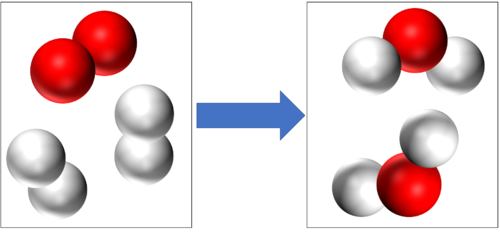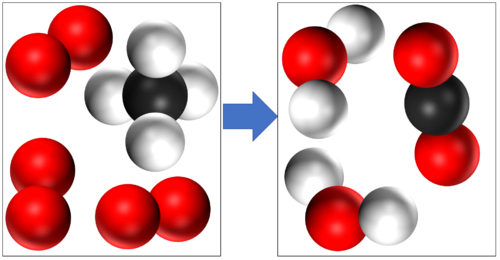Difference between revisions of "Chemical Reaction"
(→About Chemical Reactions) |
(→About Chemical Reactions) |
||
| Line 20: | Line 20: | ||
: '''Chemical reactions''' often need some [[energy]] to start, like [[combustion]] where the [[fuel]] needs to be [[Heat|heated]] to start. | : '''Chemical reactions''' often need some [[energy]] to start, like [[combustion]] where the [[fuel]] needs to be [[Heat|heated]] to start. | ||
: If a '''chemical reaction''' gives off more energy than it needs to start then it is called an [[exothermic]] '''reaction'''. In these '''reactions''' the [[temperature]] increases. | : If a '''chemical reaction''' gives off more energy than it needs to start then it is called an [[exothermic]] '''reaction'''. In these '''reactions''' the [[temperature]] increases. | ||
| − | : If a '''chemical reaction''' takes in more energy than it gives out then it is called an [[ | + | : If a '''chemical reaction''' takes in more energy than it gives out then it is called an [[endothermic]] '''reaction'''. |
In these '''reactions''' the [[temperature]] decreases. | In these '''reactions''' the [[temperature]] decreases. | ||
Revision as of 17:39, 29 September 2018
Contents
Key Stage 2
Meaning
A chemical reaction is when one substance changes into another.
About Chemical Reactions
- Most chemical reactions are irreversible.
- Chemical reactions usually cause a change in temperature.
- Chemical reactions you should know are:
Key Stage 3
Meaning
A Chemical Reaction is when the atoms in molecules break their bonds and form new bonds, usually with other atoms.
About Chemical Reactions
- Most chemical reactions are irreversible.
- In a chemical reaction the atoms rearrange to form a new substance.
- Chemical reactions often need some energy to start, like combustion where the fuel needs to be heated to start.
- If a chemical reaction gives off more energy than it needs to start then it is called an exothermic reaction. In these reactions the temperature increases.
- If a chemical reaction takes in more energy than it gives out then it is called an endothermic reaction.
In these reactions the temperature decreases.
Examples
These are two examples of Combustion
|
2H2 + O2 → 2H2O |
|
Methane + Oxygen → Water + Carbon Dioxide CH4 + 2O2 → 2H2O + CO2 |
Types of Chemical Reaction
- Combustion - A chemical burns in the presence of Oxygen.
- Thermal Decomposition - A compound breaks down into smaller compounds.
- Oxidation - A chemical reacts with Oxygen.
- Displacement Reaction - One element replaces another in a compound.
- Neutralisation - An acid and a base react to make a salt.

